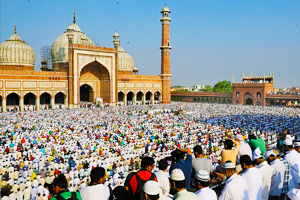 June 6 marks the start of Ramadan this year and almost three million Muslims in the UK will be facing a tough holy month. Experts say that Muslims in the northern hemisphere will be having the most challenging one in 30 years. This is due to the extremely long summer days that would provide very short windows to break daily fasts. Since the Islamic holy month spans the summer equinox, there will be early dawns and late sunsets. This would mean up to 20 hours of fasting for some people.
June 6 marks the start of Ramadan this year and almost three million Muslims in the UK will be facing a tough holy month. Experts say that Muslims in the northern hemisphere will be having the most challenging one in 30 years. This is due to the extremely long summer days that would provide very short windows to break daily fasts. Since the Islamic holy month spans the summer equinox, there will be early dawns and late sunsets. This would mean up to 20 hours of fasting for some people.
The Muslim Council of Britain is staying positive amidst the challenging Ramadan, stating that it is all “part and parcel of the experience.” They also strongly believe that Muslims are motivated to fast from sunrise to sunset; they abstain from food, drink and sex. The elderly, sick, very young children, as well as pregnant and menstruating women are exempted from fasting.
Concerns of UK Schools over Fasting during Exams
The crescent moon determines the dates of Ramadan, which move forward by 10 or 11 days yearly in a 33-year cycle. This Islam ritual has been gradually moving to the summer exam. Some schools in the UK, specifically in Northern Ireland, Wales and England have expressed their concern over fasting during exam season. They believe that students should be allowed to break their Ramadan fasting to avoid low grades.
School heads are worried that Muslim students may get sick, exhausted and anxious while balancing their religious and school obligations. Since they are required to fast all day during hotter and longer days, there are concerns over poor academic performance. The Association of School and College Leaders (ASCL) urged parents earlier this year to allow students to break their Ramadan fast, as well as inform them that extra devotions are voluntary to avoid exhaustion and failing in their exams.
ASCL officials have emphasized that they are not being prescriptive in any way and are not dictating students what they should be doing especially when it comes to their religion. They have also had discussions with Muslim clerics that the best way to handle this issue is to have parents educate their children that if they choose to observe Ramadan, they should also not neglect their school duties. Muslim ministers on the other hand, have stated that there can be some “relaxation” for students in terms of fasting. They can make up for fasting time at a later date, outside Ramadan.
Tips on how to stay healthy during Ramadan and Exam Season
Here are a few tips that would be helpful while fasting and studying:
- Sleep early and get at least 8 hours of sleep at night, and one nap within the day to avoid being tired.
- Make sure you eat a healthy, high-energy diet in your Suhur or meal before your fast. Wake up early so you can savour your meal and avoid being in a rush. Drink enough water and fresh juices, as well as consume fruits to prevent dehydration. Staying hydrated in the peak of summer is very important. Exclude foods that are spicy, processed and salty as they will increase your thirst while you are fasting.
- Stay away from high intensity activities, which can make you weak and thirsty. During your exam week, focus your energy on studying instead of doing rigorous physical activities. Nonetheless, light exercise can be beneficial when you are fasting. Exercise after you break the fast and make sure to hydrate during and after your session.
- When you feel tired or stressed from studying, take short breaks to meditate, pray or nap. Showering and taking baths will also help energise your body.
- Help in preparing the Iftar, or evening meal after your fast. Prepare your favorite meals so you have something to look forward to. However, choose meals that are easy to prepare so it would not entail too much work.
- Upon breaking the fast, it is best to do it slowly by consuming water and dates first, then have a bowl of soup and salad. If you already feel full, you may eat your main meal a few hours later. Opt for healthy meals and avoid fried and other junk food to prevent feeling bloated and sluggish. Fresh vegetables, fruits, fish and lean meat are best options. Gradually eat your meal and do not overeat to avoid a spike in your glucose levels.
- Have a positive outlook so you don’t feel depleted or anxious. Being positive makes you a step ahead in fulfilling your religious and school obligations.
We at Essay Writer would like to wish all Muslim students a Ramadan Mubarak!
 English
English 中文
中文
